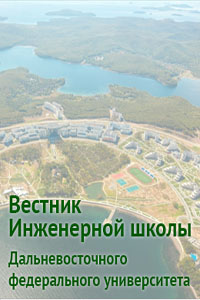Assessment of stability and crack growth trajectories in rails under cyclic loading conditions
DOI:
https://doi.org/10.24866/2227-6858/2024-4/18-30Keywords:
rail, internal transverse crack, cyclic crack resistance, fatigue fracture, rail residual lifeAbstract
This article examines methods for analyzing and predicting the development of subsurface cracks in the railhead. Particular attention is given to longitudinal-transverse and transverse cracks, as well as the factors influencing their growth and trajectory changes. The objective of the research is to develop and refine analytical and numerical methods for predicting the growth trajectory of subsurface cracks in rails under cyclic loading. The focus is on assessing the potential for longitudinal cracks to transition into transverse cracks and determining the conditions under which this phenomenon occurs. Research methods include the application of fracture mechanics, analytical calculation models, and numerical simulations using the finite element method. Equations describing the stress-strain state of the rail and crack growth stability criteria are employed. The calculations account for contact load parameters that influence crack growth and trajectory changes, such as friction force, contact patch size, and the relative position of the crack. Results show that longitudinal-transverse cracks in rails develop significantly faster than transverse cracks, substantially increasing the risk of rail failure. It is established that under certain conditions, the crack growth trajectory may deviate, leading to its transition into a normal separation crack. Numerical experiments identified critical load parameters and crack geometry affecting the likelihood of unstable crack growth. Practical significance: The study's findings can be used to improve the prediction and prevention of rail failures under operational conditions, thereby enhancing railway transport safety. The assessment models and methods can be integrated into rail track diagnostics and monitoring systems, enabling timely detection and elimination of hazardous defects.
References
Абдурашитов А.Ю. Исследование взаимосвязи между величиной бокового износа рельсов и процессом зарождения внутренних поперечных трещин в их головке // Тезисы докладов 2-го Международного симпозиума по трибофатике. ИМАШ, 1996. С. 96–97.
Marich S. Fatigue and fracture associated with surface and sub-surface defect in rails // Fracture prevention in energy and transport systems: Proc. Conf. Rio de Janeiro. Nov. 28, 1983. Vol. I. Warley, 1984. P. 25–36.
Смирнов В.И., Атрошенко С.А. О трещиностойкости рельса с поперечным усталостным дефектом // Актуальные вопросы прочности: сборник тезисов LXVII Международной конференции, Екатеринбург, 02–05 апреля 2024 года. Екатеринбург: Уральский государственный горный университет, 2024. С. 177–179. EDN: IXJLJN
Farris T.N., Keer L.M., Steele R.K. The effect of service loading on shell growth in rails // J. Vech. Phys. Solids. 1987. Vol. 35, no. 6. P. 677–700.
Wojcik R. Direction of crack growth initiation in roller contact: strain energy density criterion / Theor. and Appi. Fract. Mech. 1991. Vol. 15, no. 2. P. 191–198.
Yu M.M., Keer L.M. Growth of the sheel / transverse defect in rails // Trans. ASME. J. of Tribology. 1989. Vol. III. No. 4. P. 648–654.
Сосновский Л.А., Махутов Н.А., Шуринов В.А. Контактно-механическая усталость: основные закономерности (обобщающая статья) // Заводская лаборатория. 1992. № 11. C. 44–61.
Сосновский Л.А., Махутов Н.Л. Методологические проблемы комплексной оценки поврежденности и предельного состояния силовых систем // Заводская лаборатория. 1991. № 5. С. 27–40.
Богданов В.М., Горячев А.П., Горячева И.Г. и др. Моделирование процессов контактирования, изнашивания и накопления повреждений в сопряжении колесо – рельс // Трение и износ. 1996. Т. 17, № 6. C. 12–26.
Смирнов В.И., Майер С.С. Многоцикловая трещиностойкость балки с внутренней трещиной в эксплуатационных условиях // Вестник гражданских инженеров. 2021. № 2(85). С. 68–74. DOI: https://doi.org/10.23968/1999-5571-2021-18-2-68-74
Смирнов В.И., Майер С.С. Влияние формы внутренней поперечной трещины на усталостную прочность балки при циклическом изгибе // Вестник гражданских инженеров. 2022. № 4(93). С. 58–64. DOI: https://doi.org/10.23968/1999-5571-2022-19-4-58-64
Кошохов А.Д., Шур Е.А. Пластическая деформация головок рельсов с контактно-усталостными разрушениями // Вестник ВНИИЖТ. 1964. № 2. C. 52–55.
Тариков Г.П., Акулова Е.М. Определение трещиностойкости рельса при его контактном взаимодействии с колесом // Механика. Исследования и инновации. 2020. № 13. С. 147–153. EDN: UGSSCH
Атрошенко С.А., Смирнов В.И. Механизмы разрушения рельсовой стали с внутренними трещинами после эксплуатации // Актуальные проблемы прочности (АПП-2023): материалы LXVI Международной конференции, Зеленогорск, Санкт-Петербург, 23–27 сентября 2023 года. Санкт-Петербург: Изд-во ВВМ, 2023. С. 72. EDN: PSWSKW
Downloads
Published
Issue
Section
License
Copyright (c) 2024 Far Eastern Federal University: School of Engineering Bulletin

This work is licensed under a Creative Commons Attribution 4.0 International License.

